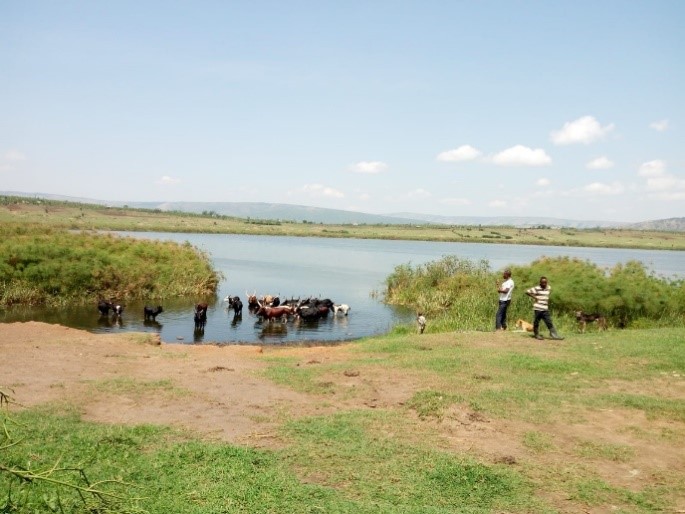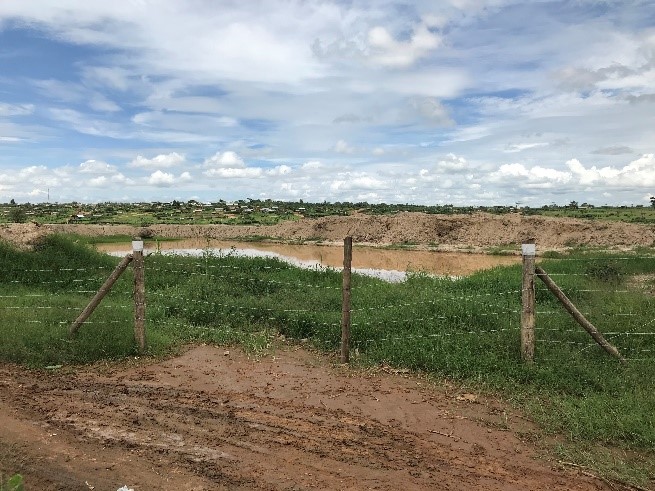IWRM: accommodating refugees in Nakivale refugee settlement
IWRM: accommodating refugees in Nakivale refugee settlement

Panoramic view of Nakivale refugee settlement around Lake Nakivale
Contact details
Submitted by: Laura Basco Carrera; Water Resources Management Expert; Water and Refugee Settlements Coordinator
Email: [email protected]
Website: https://www.deltares.nl/en/
Introduction to the project
Country
Uganda
Duration
May 2017 - finalization of the project expected in 2020
Description
This project emerged as a response to the Global Compact on Refugees by particularly integrating the CRRF and REHOPE frameworks with Integrated Water Resources Management (IWRM) to bring water security to the refugees in Nakivale refugee settlement and the hosting population in the Rwizi catchment.
By considering water resources and water security from a development perspective in the site selection for accommodating new refugees, the effective and more efficient use of resources can be maximized not only within the refugee settlement, but also catchment-wide, where the hosting community lives, while protecting the environment. These objectives are also reflected in the objectives and associated criteria used for site selection:
-
High safety for the refugee community
-
High reliability of raw water quantity
-
High acceptance and integration of refugees in the host community
-
Low costs
This new approach brings significant co-benefits to both communities in terms of improving their welfare and economic prosperity through the creation of livelihood opportunities, as well as their peaceful co-existence.
Another important co-benefit of such new approach is the enhanced collaboration between actors. In particular, the engagement of actors that traditionally work in the humanitarian context supporting refugees and forced displaced people with actors that are involved in the governance and development of the country e.g. formulation and implementation of national development plans or sectoral plans. The partners involved in this project are a reflection of such multi-stakeholder collaboration.
Finally, an important goal of the project was to develop a generic framework and associated methods, models and tools that could be applied worldwide. The piloting of the framework, methods and tools in Nakivale refugee settlement illustrates the successful application of the generic framework (i.e. from global to local approach) and shows its potential to be adapted and replicated elsewhere. Moreover, its flexibility allows its broaden application, for instance, for site selection to accommodate internally forced displaced people due to a natural disaster.
Project aims
The project aims to support the site selection for accommodating new refugees considering the feasible capacity of the area in terms of water resources and water security, from a development, IWRM perspective. Methods, models and tools are developed to allow quickly-made informed decisions on where to accommodate these new refugees considering the time constraints and the data scarcity environment.
The accommodation of 10,000 - 30,000 newly-arrived refugees from DRC in Nakivale refugee settlement in Uganda, was considered as pilot project. Three options were considered for the study: (i) enlarge Nakivale refugee settlement; (ii) build a new refugee settlement; or (iii) accommodate new refugees in urban/rural areas together with the hosting community.
Resources used
Uganda is one of the few countries in the world that is already responding to the Global Compact on Refugees by piloting the Comprehensive Refugee Response Framework (CRRF). The rights of refugees are enshrined in Uganda’s 2006 Refugee Act and the 2010 Refugee Regulations. Moreover, the REHOPE – Refugee and Host Population Empowerment Strategic Framework - is a key component in the application of the CRRF and aims the integration of refugees into the national development and sectoral plans in Uganda. The implementation of CRRF and REHOPE frameworks is reflected in the Country Refugee Response Plan. Within these lines, refugees have freedom of movement and are included in the host communities through access to basic and social services such as education and labour markets, following the whole-of-society approach.
In terms of water and environment, this new approach gives priority to employing a catchment-based IWRM approach to address water and environment issues in refugee settlements and host communities. So as to sustainably develop and protect water and related resources while improving people’s livelihoods both during a crisis and afterwards.
These sector plans enable Uganda to clearly highlight where the international community may usefully channel support for a comprehensive and people-centred response in its refugee-hosting districts in the long run and provide more space and capacity to humanitarian actors to meet critical life-saving imperatives.
Partners
- UNHCR HQs in Geneva and UNHCR Uganda
- Ministry of Water and Environment in Uganda, Directorate of Water Resources Management
- Victoria Water Management Zone team
With specific collaborations from:
- Office of the Prime Minister in Uganda
- Delft University of Technology
- Aalto University in Helsinki
Challenges and how they were overcome
This project was highly innovative as new methods, models and tools needed to be developed in order to achieve the project objective.
Integrating the humanitarian and the development perspectives in terms of water and environment brings with it significant challenges. Following the IWRM approach, the refugee settlement should not be considered as a boundary for the developments, instead the catchment boundaries should be considered. A new framework was developed in collaboration with the Victoria Water Management Zone team to incorporate these adjustments in catchment and refugee settlements management and planning.
Second, the uncertainties associated with the timing and variability of influx of new refugees are significant. Moreover, the uncertainties related to (accessible) data availability and quality are substantial, especially considering the time span in which decisions need to be made when refugees enter in the hosting country. The new methods, models and tools required for the integrated assessment of water resources and water security needed to be able to address specific requirements: (i) rapid assessment (combining global and local data and models); (ii) feasible for data scarcity environments (and often poor-quality data); and, (iii) accurate enough for decision-making. As response to these challenges, new methods to integrate global and local data, new models and tools were developed. The integrated water resource assessment conducted as part of the project included: a drought risk assessment, water availability (surface and ground water and rainfall) and water balance, a water quality assessment and a costs assessment. A multi-criteria decision analysis was conducted for developing and selecting the preferred set of options considering the objectives and criteria commonly used for site selection in terms of water security and following the IWRM approach. The collaboration and support from UNHCR Geneva and Uganda, and other global and national stakeholders such as the Ministry of Water and Environment and the Office of the Prime Minister was critical in this project element.
Third and most important, even though the project provides a set of preferred options on where to accommodate new refugees considering the availability of water resources and water security, there are other criteria that play a major role when selecting the site to allocate new refugees. These can include political, cultural, economic or social reasons. There needs to be the political will to also consider water resources and water security in the criteria for site selection particularly when following a development perspective
Results of the Good Practice
- Guarantee reliable access of refugees to adequate drinking water in the same conditions as the hosting population, in accomplishment of the WHO and UNHCR water supply targets;
- Reduce the vulnerability of refugees and the hosting community to water-risks;
- Guarantee a more effective and efficient use of water and natural resources in the refugee settlements and within the catchment to improve the welfare and livelihoods of the refugee and hosting populations, and as a result, empowering both communities and improving their social cohesion.
Next steps
A 3-days workshop will be organized in 2020 for transferring the knowledge, methods, models and tools to UNHCR, the Ministry of Water and Environment, the Victoria Water Management Zone team and other stakeholders.
Furthermore, a set of measures will be studied for implementation in the catchment area as well as in Nakivale refugee settlement to improve the water security conditions, together with the actors afore mentioned and development agencies in order to ensure collective action.





